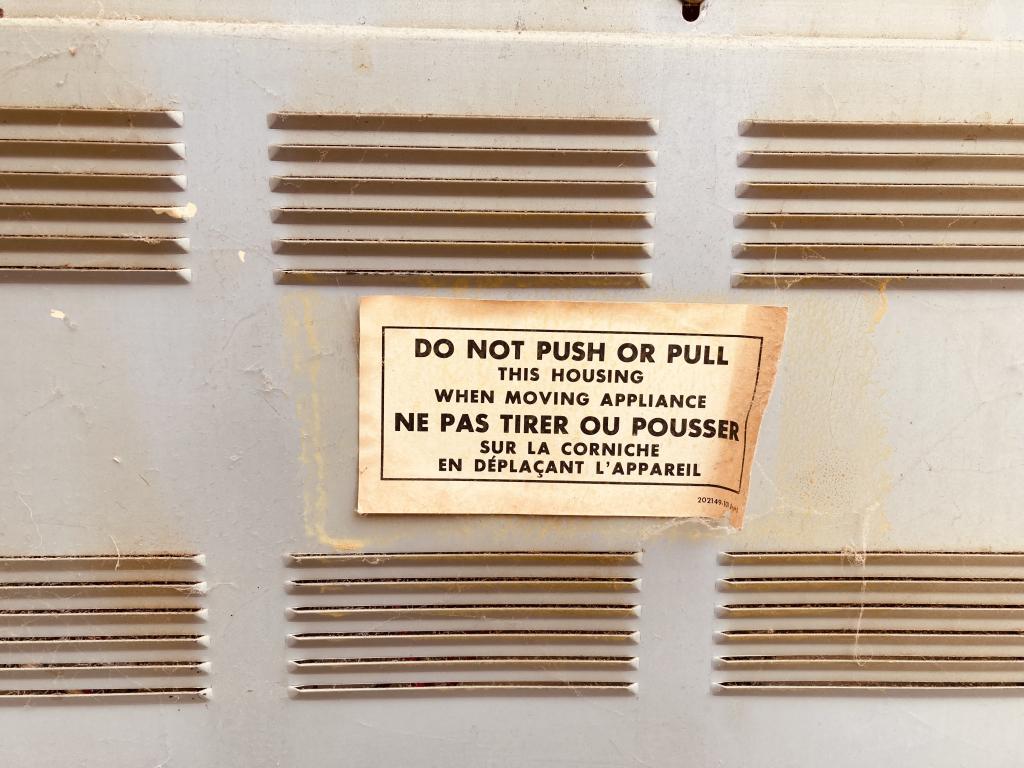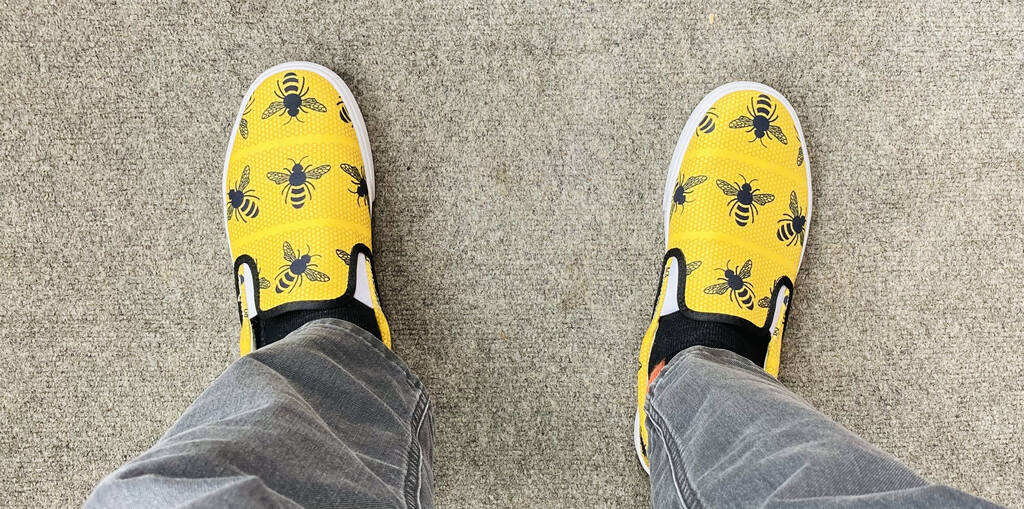I Was a Teenage Communist, a 1982 sketch from SCTV, is from an era of the show when it was firing on all cylinders: terrific attention to detail, fine writing, brilliant makeup and costuming, and pitch-perfect satire.
Although it’s a send-up of 1950s American paranoia, it’s remarkable how the broad strokes of the sketch mirror my own experiences as a rebellious student just a few years after it aired: I clearly remember a night in a smoky rock ‘n’ roll bar where I was befriended by a transcendent agitator who later went on to work as a translator for Granma in Cuba. She was full of infectious revolutionary fervour, and I was buying what she was selling.
If I’m any guide, winning young hearts and minds is surprisingly easy.
Spotted in the back of a 1983 oven placed at the curb on Prince Street for next week’s large garbage removal.

While trying to help Oliver find new shoes, I came across a pair for myself. Bucketfeet Save the Bees shoes, by artist Laurel54. They arrived this morning.

Something I haven’t read much if anything about as a side-effect of COVID-19 is the death of cash as a way of paying for things.
I have $60 in my wallet that’s been there since, what, Christmas?
For many years I kept cash in my wallet because there were a handful of places that didn’t have payment machines: for the longest time Tai Chi Gardens was cash only, as was the sushi place Monsoon. And the Charlottetown Farmers’ Market was always generally a cash-only marketplace, although a couple of vendors allowed you to pay with square.
Today? Nothing. There’s absolutely no need to keep cash in my wallet at all.
We achieved a cashless society without even noticing.
Costas Halavrezos, spice merchant and former siren of the airwaves, has resuscitated his email newsletter, and least for an issue.
I have long enjoyed the 1980 Christopher Cross song Ride Like the Wind. Listening to it this morning I realized that one of the reasons I like it so much is the backing vocals by the estimable Michael McDonald (he of the Doobie Brothers, Steely Dan, and a successful solo career).
Oliver and I listened to the song this morning in the car: McDonald’s contribution–we counted–amounts to only four utterances of “Such a long way to go…” Nonetheless, without those the song wouldn’t be as delightful as it is.
Like salt, sometimes all you need is a little, but without that little the food doesn’t taste nearly as good.
(Clip from The Very Best of Christopher Cross, 2002)
What went unreported in this 2003 post about dinner out in Bilbao was that the night ended with the poovalanche of all poovalanches in the Oliver department of the family.
What Catherine would chime in with at this point, were this a dinner party and not a blog post (and were she still alive), would be that, in my inebriated state, I was of no help at all, becoming obsessed with side issues that had nothing to do with the central challenge of sluices of poo leaking out everywhere.
There were poovalanches before that night in Bilbao—the great Christmas Poovalanche of 2000, in The Gap at Yorkdale Shopping Centre in Toronto comes to mind—and poovalanches after that night in Bilbao, but that night in Bilbao, at least in my sodden memory, was as poovalanche as it ever got.
My favourite interviews are those conducted by interviewers with nothing to prove; it’s why I enjoy listening to Alec Baldwin so much: he’s famous (and infamous) enough that he’s generally the equal of any of his subjects.
I enjoy this Adam Savage interview of artist Tom Sachs for the same reasons: two weird master creative fabricators in conversation.
I was sad to read this morning of the death of Jean Doherty.
I worked with Jean over the years in many different capacities, most recently through the PEI Home and School Federation, when I was President and Jean was handling communications for the Department of Education.
Jean was that rare public servant who never developed a thick skin: she was universally helpful and kind, and genuinely believed in the work she was doing, and the benefits of clear and effective communication. I always enjoyed our interactions.
She will be missed.
Back during my brief flowering as a writer of comedic songs–Kitchen Utensil Love, Gay Squirrels, etc.–I wrote a song about Sesame Street, the lyrics of which evade me now, other than “Mr. Hooper is Dead, Grover is a Alcoholic.”
I thought about that song when I came across this passage in The New Yorker in the story How We Got to Sesame Street:
For Kamp, “Sesame Street” peaked in 1983, after the death of Will Lee, the actor who played Mr. Hooper, the neighborhood grocer. Lee, a former member of a radical theatre troupe, had been called before the House Un-American Activities Committee in the nineteen-fifties and been blacklisted from television; “Sesame Street” had become his theatrical home. He was much admired by the rest of the cast, and the writers decided to reckon, on air, with grief. Big Bird, told that Mr. Hooper is dead, wants to know when he’s coming back. “Big Bird, when people die they don’t come back,” a cast member says, softly. Big Bird tilts his head, yellow feathers fluttering, and whispers, unbelieving, “Ever?”
I remember that episode of Sesame Street like it was yesterday: the stunning absence of Mr. Hooper, Big Bird uttering that line. I’m pretty sure that Mr. Hooper cum Will Lee’s death was the first time I remember “death” being a thing.
 I am
I am